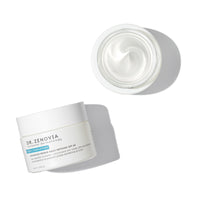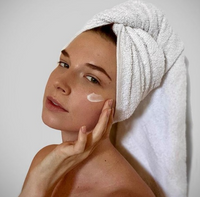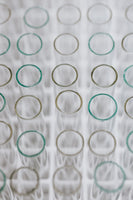Collagen for Healthy Skin: What Is It & How to Get It

What is Collagen?
Collagen is the skin’s fundamental structural protein- comprising 70-80% of the volume of our skin. The primary concern in aging skin is the amount of collagen that is broken down over time. UV damage and endogenous (internal) aging results in a loss of the skin’s collagen and elasticity which leads to wrinkles and sagging, respectively. Collagen is abundant in young, healthy skin and is often considered the foundation for ideal texture and tone.
Collagen Breakdown
Collagen breakdown is a natural process due to both endogenous (inside) and exogenous (outside) factors. The most cited exogenous cause of collagen breakdown is ultra-violet radiation (sun exposure), which can lead to photoaging and skin cancer. Endogenous enzymes also break down collagen and these are triggered by age, toxins (like nicotine), and genetic factors.
Collagen Stimulating Ingredients
Ingredients that stimulate collagen production or inhibit collagen breakdown include retinols such as vitamin A, peptides, and antioxidants (like vitamins C and E).
Retinol
Retinols are a vitamin A derivative that enhance skin cell turnover. Retinol also inhibits endogenous enzymes that breakdown our collagen as we age and work as a protective function to help preserve our skin’s collagen. Retinols are considered a must-have for any anti-aging regimen and are considered the best collagen preserver secondary to sunscreen.
Peptides
Peptides are large proteins that aid in firming and tightening the skin by helping to generate collagen. Peptides can be difficult to absorb, however, using a product that has penetrable peptides can work to stimulate fibroblasts, the cells that produce collagen.
Antioxidants
Antioxidants help protect the skin from the damaging effects of free radicals stimulated by UV exposure which ultimately destroys cells. Antioxidants help to prevent the breakdown of collagen by fighting the free radical damage we are exposed to throughout the day. Antioxidants can be found naturally in foods such as blueberries or applied topically in the form of ingredients like vitamin C, Coffee Berry, or vitamin E.
Related Article: Derm-Recommended Supplements for Hormonal Acne
Role of Collagen on Acne Scarring
Acne scars can be present for years after active acne has healed. They are caused by the skin’s attempt to heal which often appears “imperfect” in the form of scarring. Some acne scars will heal naturally with time and protection from UV exposure. However, for indented scars to heal, the skin’s collagen must be stimulated. Topical treatments cannot heal indented acne scars. Laser treatments are required to diminish these types of scars.
How to Prevent Collagen Breakdown
In addition to topical treatments, eating a high antioxidant diet can help prevent the breakdown of collagen. Eating certain superfoods on a regular basis can support the skin’s collagen levels. These foods are free oxygen radical absorbers, such as lycopenes (tomatoes), vitamin C (citrus products), green tea (matcha), blueberries, and walnuts.
All of these foods are proven to "absorb" the oxidative damaging particles to help the cells stay efficient. Further, purified omega 3 fatty acids are a powerful anti-inflammatory supplement, which impacts many organ systems, including the heart, gut, brain, and skin. Inflammation is damaging to all cellular processes, including collagen breakdown. Therefore, the powerful anti-inflammatory effects of omegas help the body recover from this damage.
Bottom Line
A combination of collagen-stimulating topical products and a nutrient-rich diet can help improve the skin’s longevity and collagen levels for vibrant and youthful skin.
The key to radiant skin is collagen preservation!
Be sure to follow @drzenovia on Instagram to learn more about hormonally impacted skin!









Leave a comment